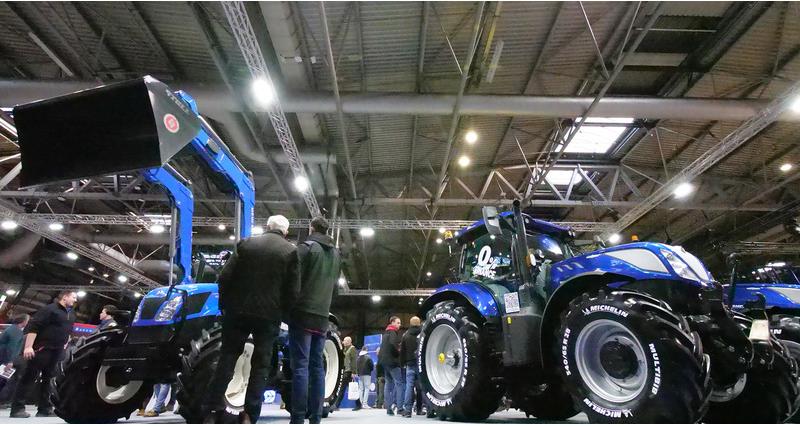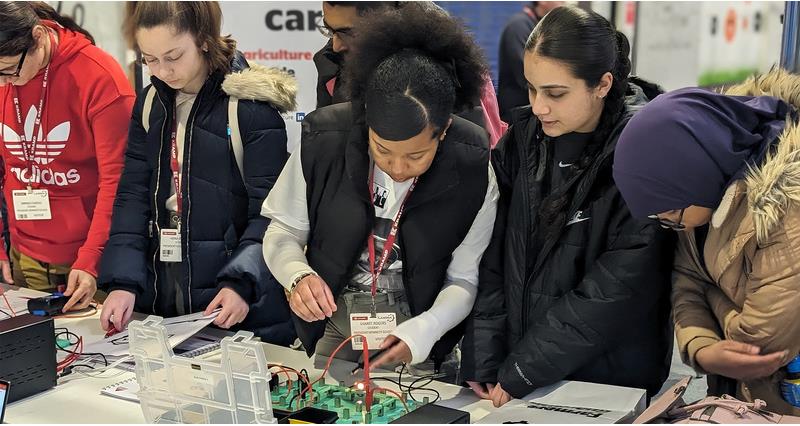Walking along the endless aisles of the NEC in Birmingham consisting of millions of pounds worth of agricultural machinery and technology is staggering to take in, especially for someone coming from a relatively modest dairy farm in Staffordshire, but an invaluable experience that needs to be showcased more to the general public.
The British agricultural industry remains world-leading in the innovative and forward-looking technology produced and used in this country towards food production and environmental protection. From tractors reaching nearly 800 horsepower, combines that can harvest more crops in less time than ever before, to machinery of a smaller persuasion that we ourselves may use at home to keep our cows happy and healthy.
New releases such as the 9s Massey Ferguson tractor, New Holland CR11 Combine and Case IH Quadtrack tractor stood out from the rest, but there were also smaller companies selling more unique products related to areas such as soil science and carbon sequestration.
It was easy to forget the proportions of much of the kit present – you couldn’t walk far before coming across a jaw-dropping tractor which you’ll dream of one day owning.
The passion and insight of those working for the businesses present was obvious and encouraging to see, and showed the British agriculture industry will continue to be a hotbed for environmental technology development, particularly with the added incentive for farmers to generate income from the SFI (Sustainable Farm Incentive) post-Brexit government support.
‘Physical and mental health must be prioritised’
Whether they were there simply for a day out or indeed the free merchandise, it was nonetheless encouraging to see the sheer number of young farmers present.
They are the next generation of our industry’s farmers and growers, and it will be on us to meet the opportunities and challenges head on that are encountered.
It was especially inspiring to see lots of people of a more diverse background in attendance, and we must do more as an industry to ensure their prosperity and inclusion. It was not only an opportunity for customers to catch up with suppliers and dealers, but farmers to socialise with each other too, which is so important in a sometimes lonely and challenging profession.
The presence of the Farming Community Network along with the Yellow Wellies Farm Safety Foundation corroborate this, for physical and mental health must be prioritised in our industry.
It was not only an opportunity for customers to catch up with suppliers and dealers, but farmers to socialise with each other too, which is so important in a sometimes lonely and challenging profession.
NFU Student and Young Farmer Ambassador Magnus Brown
Supply chain and cost pressures continue
The number of trade stands present was impressive in number and market presence, but I couldn’t help but think of the current tough situation farmers across different sectors face.
In the dairy industry, we are still seeing supply chain and cost pressures, affecting the confidence of some to invest. All of the businesses associated with agriculture present at LAMMA reminded me that our profitability is not only important for ourselves, but also for the endless list of other businesses that rely on us such as machinery manufacturers, agronomists and feed suppliers.
The NFU’s presence at LAMMA is so important for supporting businesses and scrutinising government policy. Without the valuable work of the NFU, the agricultural industry would not be in the strong position it is now.
If we do not have the long-term confidence to invest and innovate, these companies will not either. We must keep people on the land operating, selling and fixing the machinery present at LAMMA, for the number of livelihoods reliant on the agricultural industry is more than many think. On our dairy farm in Staffordshire, the number of professions reliant on our profitability is ever clear to see.
LAMMA is only the start of an exciting year of agricultural shows and events that showcase the bright future of the British agricultural industry, and the potential still yet unlocked. Let us hope the optimistic atmosphere present at LAMMA continues throughout this year and beyond, for there is so much to be positive about British agriculture.




